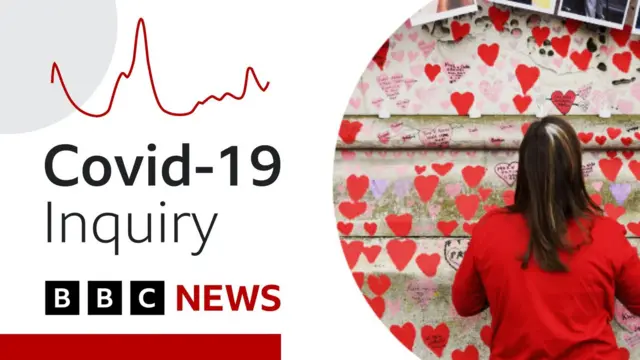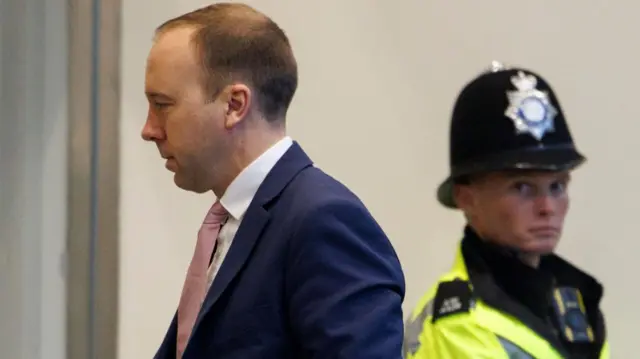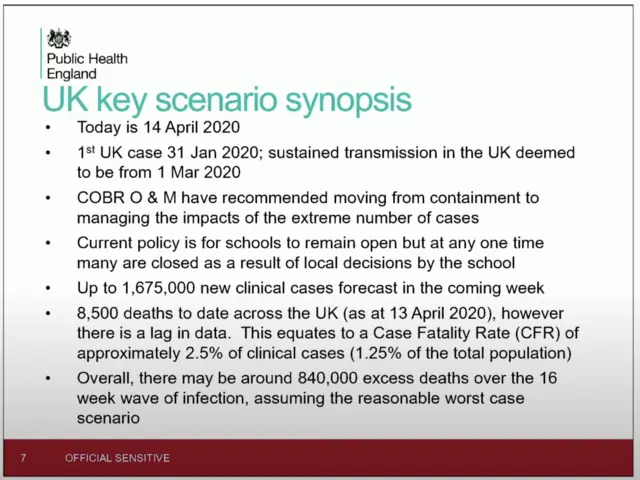The hearing resumespublished at 13:54 GMT 30 November 2023
The inquiry is back - stay with us as we continue to bring you all the updates.
Matt Hancock says school closures could have been avoided in January 2021 if the government had acted more swiftly on spiralling Covid cases
He tells the Covid inquiry that he argued introducing restrictions later would mean "a tougher lockdown with more economic damage"
Hancock also accepts "transgressions" in his personal life may have impacted the public's confidence in Covid rules
He resigned as health secretary in June 2021 after footage emerged of him kissing aide Gina Coladangelo
Elsewhere, Hancock says he was "in despair" when the government announced a tier system in England, which it "knew would not work"
He says this was because local politicians were "under significant pressure" not to accept the measures
Yesterday he said that entering lockdown three weeks earlier would have cut deaths in the first Covid wave by 90%
Edited by Nathan Williams
The inquiry is back - stay with us as we continue to bring you all the updates.
The inquiry has resumed after lunch.
A reminder, you can watch every moment by pressing Play at the top of this page.
If you can't see the icon, refresh your browser or reload this page on the BBC news app.

Before the inquiry resumes, here's a clip of Matt Hancock's evidence this morning.
There was a "deep unpleasantness" at the centre of government during the pandemic, the former health secretary told the Covid inquiry.
But while there was a "toxic culture" elsewhere, Hancock said he tried to lead his department with a "positive, can-do culture".
Watch: 'Toxic culture at the centre' during pandemic, says Hancock
 Image source, EPA
Image source, EPAMatt Hancock has spent the last few hours giving evidence to the Covid inquiry.
Let's have a quick recap of the key moments from this morning:
The inquiry is expected to resume around 13:45 GMT.

 Henry Zeffman
Henry Zeffman
Chief political correspondent
The question of Matt Hancock’s honesty has been a pivotal part of so many previous witnesses’ evidence.
Hugo Keith KC put the question fairly starkly to the former health secretary: how could so many people "have concluded that the secretary of state for health in the maw of this public health crisis was a liar?"
Hancock’s response was straightforward: "I was not".
He said that there is "no evidence" from those who worked with him in the health department that he lied and again blamed the allegations against him on the "toxic culture" in Number 10.
This exchange shows how high the stakes are for Hancock here. There is the central matter of what the inquiry concludes about his actions, and how they helped or hindered the government’s handling of the pandemic.
But zoom out briefly. Hancock is only 45. He is standing down from the Commons at the next election but clearly wants to continue in public life in some form.
So another crucial personal task he faces today is to try to save his public reputation after the brutal assault on his character from so many former colleagues.
 Jim Reed
Jim Reed
Health reporter, BBC News
Just before the break, the inquiry was talking about a government training scenario called Exercise Nimbus which took place on February 12, 2020.
It was designed for ministers and other officials to rehearse what would happen if there was sustained transmission of a disease like Covid in the UK.
It was based on the worst case scenario that 840,000 people could die over the 16 weeks of a first wave.
Hancock, who was in the meeting, said the main conclusion was there was "no way" the government could allow the NHS to become overwhelmed.
He said the exercise was too focused on dealing with the effects of a widespread outbreak - such as the provision of body bags.
With hindsight he said there should have been more attention paid to measures to control the virus, and the timing of lockdown and other restrictions.
Interestingly, Hancock said the minutes from the exercise show he wanted clinicians to decide which groups of NHS patients should be prioritised if hospitals become overwhelmed.
When he gave evidence earlier in the inquiry, the then chief executive of NHS England, Lord Stevens, said - during the meeting - Mr Hancock said he should make that final decision.
 Image source, Covid Inquiry
Image source, Covid InquiryThe inquiry hears about a government exercise, called Exercise Nimbus. It was focussed on the likely impact on the NHS.
Hancock says that the important message that came out of this exercise was that "there was no way we could allow the NHS to become overwhelmed".
He tells the inquiry that he thought clinicians should decide how to handle the NHS.
But the inquiry lawyer asks if there were ways the exercise didn't work.
Hancock replies yes. He says with hindsight, the exercise should have looked at potential lockdowns and the decisions around this.
The exercise focussed too much on NHS treatment and mortuary space, he adds.
Hugo Keith KC tries to work out how long the reasonable worst case scenario debate rumbled on, despite it being clear the virus was coming to the UK.
Hancock insists that is not his recollection of events - emphasising that both he, his team within Whitehall and department were working on the assumption Covid-19 would come to the UK and it would be terrible.
He is then asked about what the thinking was on the virus being a "worst case scenario".
"We knew there was a 50/50 chance of a global pandemic," he says hoping that it would "peter out" like the SARS outbreak in 2003.
"What happened was essentially the worst case scenario," he adds.
The inquiry lawyer asks Hancock about two emergency Cobra meetings that took place on 24 and 29 January 2020.
During these meetings, chief medical officer (CMO) Chris Whitty set out two scenarios to consider.
The first, that the spread of the virus could be confined to China. The second, that it would not be confined and could create a pandemic.
Keith asks to what extent it was thought that it did not actually matter whether the virus left China – because there were means of practically stopping its spread.
Hancock tells the inquiry this was not his opinion. He adds that during his worst case scenario meeting, he had acknowledged the fact that if Covid spread hundreds of thousands of people could die.
The inquiry is taking a break for lunch.
Stay with us as we catch you up with a last few lines from Matt Hancock's testimony.
'Cummings caused toxic culture', says Hancock
Dominic Cummings, Boris Johnson's chief adviser, caused a toxic culture at the heart of government, Matt Hancock has said.
The former health secretary told the Covid inquiry that in future, if there is a "malign actor" such as Cummings in No 10 Downing Street, systems need to be able to work nonetheless.
 Jim Reed
Jim Reed
Health reporter, BBC News
Matt Hancock said in his witness statement that, in late January 2020, his team at the Department of Health was still being "dragged into" meetings in Number 10 about fulfilling manifesto commitments.
In December 2019 the Conservatives under Boris Johnson had won an election promising, amongst other things, to increase the number of GPs and nurses in England and double investment in dementia research.
Asked about his comments, Hancock said it would have been "far better" if that time had been spent dealing with the "gathering storm" of Covid.
It's a theme the health secretary has returned to regularly in his testimony today - that he was the one raising concerns early in the pandemic but the rest of government, and in particular Downing Street and the cabinet office, were not always listening.
Turning back to pandemic preparedness, Hugo Keith KC says that there were "few levers" in the government that could control the spread of the virus.
Hancock says he realised this was the reality in February 2020.
And discussing the government manifesto in late January 2020, Hancock's team was being dragged into meetings on its delivery.
In his witness statement, Hancock writes that time would have been better spent on planning for the pandemic.
He tells the inquiry he stands by this view and it "would have been far better" if time had been spent on the "gathering storm" that was Covid.
Turning to UK border controls and the border system as a whole Hugo Keith KC makes a point very little was done to stop infection at the start of the year.
Hancock agrees, adding the virus "blew up" in Italy - which led to border checks being brought in - in mid-February. He says this was confirmation the scientific advice had been right.
Hancock is then asked at point it was thought the test, trace and isolate system in the UK would be unable to cope.
"During February [2020]," Hancock replies.
The lawyer asks the former health secretary how, in the face of life and death, the system was allowed to be damaged by Cummings - who Hancock refers to as a "malign actor".
Hancock describes it as "deeply frustrating".
He says there were two problems - a "structural problem" with "an adviser trying to take executive authority away from the PM for a period".
And also a "culture of fear" which he says was inculcated by the Cummings' behaviour, claiming that Cummings "effectively caused" the resignation of the chancellor in February.
Hugo Keith KC says there is contested evidence that Dominic Cummings had an "unhealthy degree of influence" over Boris Johnson as prime minister.
He asks Hancock if he agrees the PM was too heavily influenced.
Hancock says "at times, yes".
Hancock says Cummings didn't like the Cobra system of emergency meetings the government was running in February 2020, and the adviser decided to take major daily decisions in his own office.
Hancock recalls Cummings saying decisions don't need to go to the PM.
"Now that is inappropriate in a democracy. I saw it essentially as a power grab," Hancock tells the inquiry.
Keith tells Hancock that Dominic Cummings believed the then-health secretary was "unfit" for the job, which we heard earlier in the inquiry.
The lawyer says the fact the PM, his chief adviser, the cabinet secretary and others questioned his candour and fitness for the job is an "extraordinary state of affairs".
"They [these allegations] are not true," Hancock replies.
Hancock claims that the "toxic culture" was "essentially caused by the chief adviser".
He adds that, "in the heat of a crisis" people say things that may not be their "full, considered opinion".
He argues that "systems" need to be in place in future so that if there is a "malign actor" (the inquiry lawyer questions if he is referring to Cummings in this case and he confirms), operations can continue despite that.
The lawyer for the inquiry turns to evidence from Sir Patrick Vallance, Dominic Cummings and Helen MacNamara.
Hugo Keith KC says all three have made reference to Hancock lying, getting overexcited, and saying surprising things that contrasted evidence.
Keith asks how could these people have concluded in the midst of a crisis that Hancock was a liar.
"Well, I was not," Hancock replies, calling them false allegations. He adds he has been through them and would be happy to answer questions on specifics.
On general sweeping allegations that he lied during the pandemic, he says there is no "evidence whatsoever".
He says there was a "great deal of hard work on our side and a toxic culture that we had to work with which seemed to want to find people to blame," instead of stopping the issue.
He drove the system hard, he says.
Moving to testing, Hugo Keith KC looks at advice from the Scientific Advisory Group for Emergencies (SAGE).
The lead counsel says the point was made by SAGE that specific tests could have been used to test asymptomatic individuals, but there were real problems with the certainty of the outcome.
For context, Hancock says this was about him wanting to test individuals at the UK border.
There was an important "linguistic" difference between the views, Hancock says as he adds Public Health England argued testing people on the border wouldn't pick up those with Covid.
 Hugh Pym
Hugh Pym
Health editor
There’s been an interesting exchange over the technical but very important issue of asymptomatic transmission.
That means a virus spreading amongst people who don't show symptoms.
Matt Hancock has been criticised in the past for underplaying the possibility that this was happening in the early stages of the pandemic.
It was vital for health officials to know whether or not people who didn’t have symptoms might have contracted the new coronavirus and unknowingly spread it to others.
If there was asymptomatic transmission then policy would have to be adjusted.
Hancock pointed the finger at Public Health England and other scientific experts who told him there was no conclusive evidence that people could become infected and then show no signs of illness.
He acknowledged it was his "biggest regret" that he didn’t push harder to change that view even if it meant overruling the scientists.